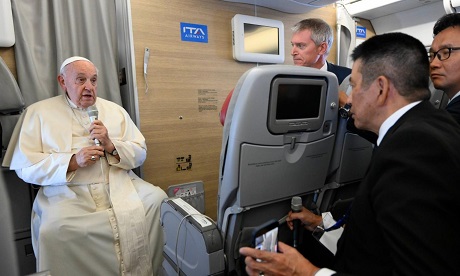Pope Francis is defending his decision to keep the October Synod discussions on the future of the Catholic Church behind closed doors, saying it is a “religious moment” and not a TV talk show.
He envisages the upcoming synodal assembly as a prayerful dialogue exercise.
He says that dialogue would be free from ideology, not full of “political chatter”.
He is insisting on guaranteeing the “synodal climate” by keeping the meeting closed to the media and public, but clarified that Synod developments will be reported by a Vatican commission headed by the Holy See’s communications chief, Paolo Ruffini.
He made the comments to journalists during his in-flight press conference when returning from Mongolia on Monday.
“There is no place for ideology but there is room for dialogue, for an exchange between brothers and sisters.”
Francis told journalists the synodal assembly should have three to four minutes of silent prayer between discussions.
This prayerful atmosphere should distinguish the synodal assembly from “parliamentarianism,” he stressed.
“Without this spirit of prayer, there is no synodality.
“The synod is the dialogue between the baptised, who in the name of the Church [discuss] the life of the Church [and] dialogue with the world on the problems that affect humanity today,” he said.
He again emphasised that the synod is not a decision-making body.
Francis though says the tradition of synods in Eastern Churches are a useful example.
“The Eastern Church knows how to live out synodality. It is living it as Christians … without falling into ideologies.”
When asked what he thought about fears that the Synod on Synodality is like opening “Pandora’s box” or could change Church doctrine, Francis had this to say:
“At the root of these types of ideas about synodality, one always finds ‘ideologies’; it is ideologies that are responsible for dividing the faithful” CNA reports.
The upcoming synod
Many Catholics are eager to see how their contributions to the synod process are considered by the bishops and laypeople chosen to represent them.
This is the first time a pope has allowed laypeople to vote alongside bishops on specific proposals. These proposals will be put forward for the pope’s consideration.
Source
Additional reading
News category: World.




